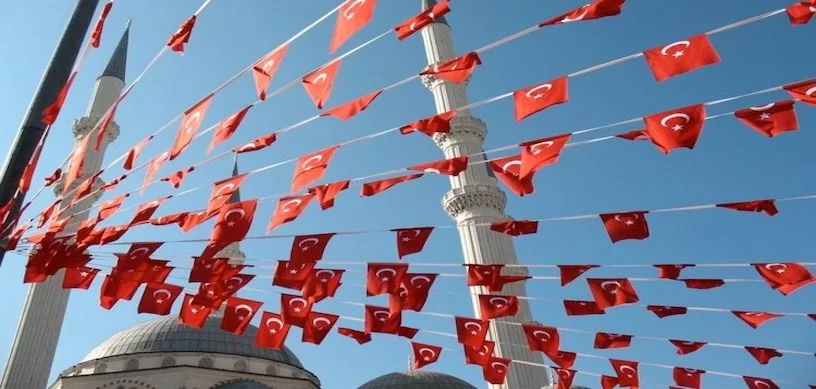IMPORTANT DAYS IN TURKEY
Every culture, belief & geography have different traditions & ceremonies with these traditions. Those who come from other cultures & geographies & want to buy a home in Turkey should learn about Turkish culture & values. In this part of our article we will talk about the Important Days.
Which public holidays are there in a year for people living in Turkey?
Before we list them chronologically, we need to know this. Some public holidays are celebrated according to the solar calendar we use now, while others are celebrated according to the lunar calendar. According to the lunar calendar, a year is 354 days. According to the solar calen-dar, it is 365 days. The difference of eleven days means that if religious holidays are calculated according to the solar calendar, they are celebrated eleven days earlier each year.
Solar Calendar
National Public Holidays
January 1 - New Year's Eve
April 23 - National Sovereignty & Children's Day
May 19 - Ataturk Commemoration Youth & Sports Day
July 15 - Democracy & national unity day
August 30 - Victory Day
October 28 - afternoon & October 29 - Republic Day
lunar calendar
Religious Public Holidays
Sugar Feast 3.5 days (It is celebrated at the beginning of Shawwal at the end of Ramadan in the Hijri calendar, which is a lunar calendar used by Muslims.)
Eid AL-Adha is 4.5 days (It is celebrated in the month of Dhu AL-Hijjah of the Hijri calendar, a lunar calendar used by Muslims.)
What are the important days that the citizens of other countries who buy a house in Turkey should know, apart from the official holidays?
The Republic of Turkey has accepted some unofficial but celebrated & valued days as important days due to its integration with European countries & its relations with the Muslim world. In addition, Nevruz Festival, which is celebrated only in the Turkish world, is one of the most valued days.
February 14 - Valentine's Day,
May 1 - Labor Day
May 6 - Labor Day
It is the commonly known day. But of course, as in every country, there are special days of the professionals, the liberation & commemoration days of the cities, & traditional festivals in Turkey. We will explain the issues in another article. However, I cannot pass without telling you some important celebrations now.
March 21 - Nevruz Festival is a Turkish holiday that represents the awakening of nature & is celebrated in countries with all Turkish culture. Some of these countries are Azerbaijan, Turkmenistan, Kyrgyzstan, Kazakhstan, Uzbekistan…
May 6 - Hidirellez, is celebrated by many peoples in Anatolia & the Balkans as a day when nature is excited & fertility increases.
How are Nevruz & Hidirellez celebrated?
These holidays are celebrated by going to beautiful places in open areas with the participation of the public. Preparations are made at home. Colorful traditional clothes are worn. Great fires are lit. It is believed that jumping over fires will make you healthier. Traditional pastries are made at home. The eggs are boiled. A full day to sit in nature, plays games, organizes competitions & picnics.
How are religious holidays celebrated?
Another issue that citizens of other countries who want to buy a house in Turkey should know is that the majority of Turkish people are Muslims. Therefore, Muslim holiday traditions are celebrated with intense participation. Muslims fast during the month of Ramadan. They- help the poor. At the end of the month of Ramadan, they visit each other wearing their newest clothes during the Sugar Feast. Children are given gifts. Magnificent Baklava is prepared for dessert & It is served to guests. There is always a sweet treat in every house visited. Guests are also offered chocolate & confetti candies. Children go from house to house collecting candy. The biggest feature of religious holidays is that the little ones kiss the hands of the elders & then take them to their foreheads. This is a very important ceremony.
Eid Al-Adha, on the other hand, is celebrated with a religious duty in which Muslims continue the tradition of Sacrifice, which came from the Prophet Abraham, and perform their Hajj duties. Fifteen days before the Eid-Al-Adha, Muslims optionally go to the city of Mecca in Saudi Arabia to perform their Hajj duties in a certain order. At the end of the pilgrimage, they slaughter their sacrifices & fulfill their pilgrimage. Those who cannot go on pilgrimage perform their sacrifice in the regions where they are located. This holiday is called Eid Al-Adha. This holiday is celebrated like Candy Festival in Turkey according to tradition. Seniors are visited. They give meat to their neighbors who cannot sacrifice. Children collect candy again, houses are visited again, & hands are kissed & taken to the forehead.
The congratulatory message & word of the Sugar Feast is as follows. “Happy Candy Day! Or have a blessed Ramadan holiday!” “Happy Eid-Al-Adha!”
People of other religions living in Turkey also participate in these beautiful holidays. Of course, being together, helping & having a good time laughing never hurts anyone.
Muslims will start fasting on March 20 in 2023. Fasting works like this: Nothing is eaten or drunk from morning light until sunset in the evening. Bad thoughts are avoided. No bad words are said. Last day of fasting is on April 20. The next day, April 21, Sugar Feast begins. First, the elders of the family & the boys go to the mosque together & perform the Eid prayer. Thus, the feast begins.
In 2023, Eid Al-Adha will be celebrated on 28 June. Sacrifices are selected from the Sacrifice Markets, which are set up one week before the feast. On the morning of the feast, prayers are performed & the Sacrifices are cut at the sacrifice sites, and the meat can either be donated to charity organizations or received & divided into three. Some are distributed to the poor, some to neighbors. The rest can be consumed within the household.
How are National Holidays celebrated?
During national holidays, the city is decorated with flags by the municipalities. People hang flags on their balconies. Televisions make broadcasts that indicate the meaning and importance of the day. State protocol also lays a wreath at Ataturk's mausoleum in the capital Ankara & pays homage to it. Afterwards, celebration ceremonies are held by the Head of State & the relevant Ministries with internal & external representations. Official transitions of military units and schools are made in the ceremony areas. Celebration balls are held at night, with the participation of the public, a march with torches, which we call the Lantern Regiment, is organized. Concerts by bands and artists are held free of charge in public places.








